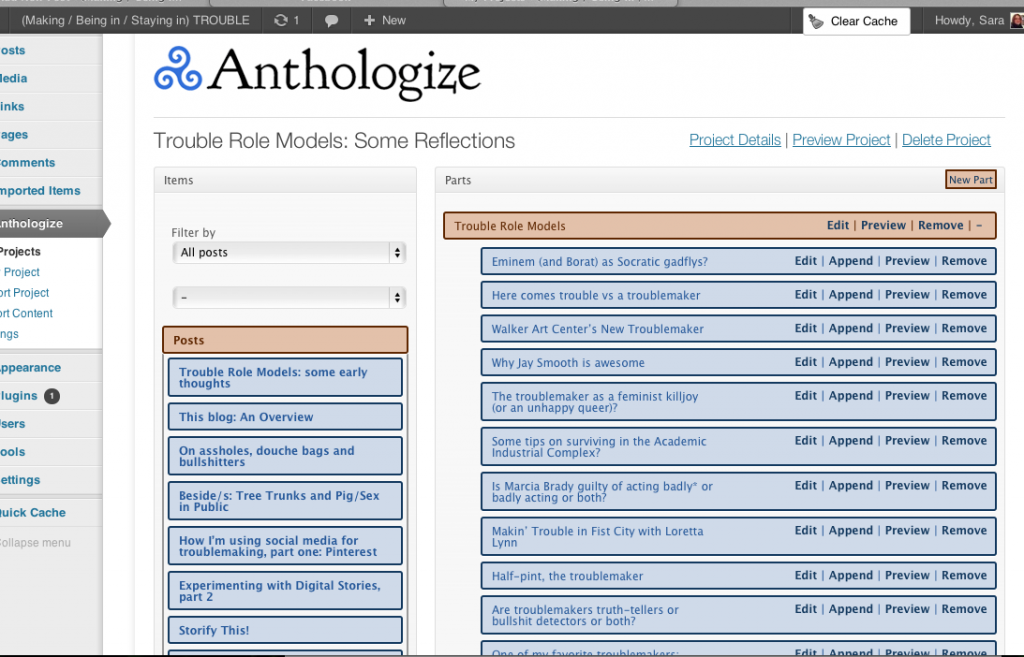Or, My Ethical Imperative: Don’t be an Asshole
Inspired by STA’s recent post, Beware the self-identified “expert”, I’ve decided to do a little bit of research and reflection on the origins and meanings of asshole and douche bag. For good measure, I’m throwing bullshitter into the mix too; I’ve already written about it on this blog and I think it’s fitting to include it beside asshole and douche bag because they all seem to be useful ways to describe people who are either too excessive or deficient in their troublemaking practices.
I appreciate the terms over other moral judgments, like bad, evil or immoral. And when I think about how to evaluate my own practices or how I want others to evaluate my practices, I find not being an asshole (or a douche bag or a bullshitter) a much more compelling achievement than being a good girl.
In “A Response to Lesbian Ethics,” Marilyn Frye (rightly) asks, “Why should one want to be good? Why, in particular, would a woman want to be good? (56). Her short answer: you shouldn’t. Her longer answer: The demand to be a good girl is intended to keep women in line, to pit them against each other–the “good girls/ladies” vs. “the bad/rebellious women,” and to prevent them from challenging dominant systems of power and privilege. Being a “good boy,” isn’t much better. In The Future of School, which I wrote about last year in this post, Paulo Freire objects to any efforts to label him a “good boy.” He writes:
I am not a “good boy.” I try to be a good person, but “good boy” — God forbid! If you want to hurt me, call me a “good boy.”
I am an educated person, very educated, polite, disciplined, and courteous. That I am, indeed, and more. I try to be respectful, but “good boy,” for God’s sake, no! So I am antagonistic to all this.
In the Queer/ing Ethics course that I taught last spring, we spent a lot of time imaging what an ethics outside of/against/beside the moral framework of good vs. bad might look like. Could an ethic with the moral imperative to “not be an asshole” fit as a queer ethic? It reminds me of Kate Bornstein’s key value: don’t be mean. Ze writes about it in the blog post: What does mean mean?
I’ve been telling people for nearly four years that the only rule in life they need to follow isdon’t be mean. It’s not even a rule. “Don’t be mean” is a value, meaning it’s something you can apply to every choice you’ll ever make for the rest of your life. If one rule can cover that much ground, I think that the rule deserves to be called a value.
Bornstein appreciates how the demand to not be mean is more expansive, and less regulating, than be kind:
And why didn’t I simply write, be kind. I almost did.
But people have ruined that word by calling for a kinder, gentler nation and then effecting a nation that’s very close to the opposite. Another example: someone could consider truthfully that they’re being kind to you when they stop you from being a homosexual… because then you won’t go to hell. It’s become too easy for people to convince themselves that they’re not being mean when they simply call themselves kind. Nope, the word kind can be stretched way out of shape. So, be kind couldn’t be the rule.
Bornstein’s discussion of “kind” reminds me of my recent troubling of Pinterest’s Pin etiquette: Be Nice. Interestingly enough, since posting about this rule, Pinterest has changed their rule to: Be Respectful. I like that much better. In fact, I think I suggested something to that effect in podcast #6 with STA over at The Undisciplined Room.
Speaking of the podcast, I just remembered that I need to prep for the one we’re doing this afternoon. Time to stop thinking about assholes, douche bags and bullshitters. In concluding this post, here are a few sources that I want to examine more closely on the topic:
1. Douche Bag by Katie Keenan. An assignment for a really cool looking class, Thing Theory from 2007.
2. On the Evolution of Douchebag
3. my class summary from queering desire, including a discussion of the hipster douche bag.
4. A Taxonomy of Proud Assholes
5. Are you dick on purpose or were you just born that way?
6. Brown Betty’s Taxonomy of Assholes
7. Bitch Media’s Douchebag Decree


